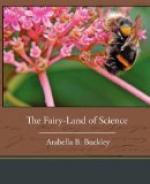It is these oxygen-atoms which we use up when we breathe. If I had put a mouse under the bell-jar, instead of the phosphorus, the water would have risen just the same, because the mouse would have breathed in the oxygen and used it up in its body, joining it to carbon and making a bad gas, carbonic acid, which would also melt in the water, and when all the oxygen was used, the mouse would have died.
Do you see now how foolish it is to live in rooms that are closely shut up, or to hide your head under the bedclothes when you sleep? You use up all the oxygen-atoms, and then there are none left for you to breathe; and besides this, you send out of your mouth bad fumes, though you cannot see them, and these, when you breathe them in again, poison you and make you ill.
Perhaps you will say, If oxygen is so useful, why is not the air made entirely of it? But think for a moment. If there was such an immense quantity of oxygen, how fearfully fast everything would burn! Our bodies would soon rise above fever heat from the quantity of oxygen we should take in, and all fires and lights would burn furiously. In fact, a flame once lighted would spread so rapidly that no power on earth could stop it, and everything would be destroyed. So the lazy nitrogen is very useful in keeping the oxygen-atoms apart; and we have time, even when a fire is very large and powerful, to put it out before it has drawn in more and more oxygen from the surrounding air. Often, if you can shut a fire into a closed space, as in a closely-shut room or the hold of a ship, it will go out, because it has used up all the oxygen in the air.
So, you see, we shall be right in picturing this invisible air all around us as a mixture of two gases. But when we examine ordinary air very carefully, we find small quantities of other gases in it, besides oxygen and nitrogen. First, there is carbonic acid gas. This is the bad gas which we give out of our mouths after we have burnt up the oxygen with the carbon of our bodies inside our lungs; and this carbonic acid is also given out from everything that burns. If only animals lived in the world, this gas would soon poison the air; but plants get hold of it, and in the sunshine they break it up again, as we shall see in Lecture VII, and use up the carbon, throwing the oxygen back into the air for us to use. Secondly, there are very small quantities of ammonia, or the gas which almost chokes you in smelling-salts, and which, when liquid is commonly called “spirits of hartshorn.” This ammonia is useful to plants, as we shall see by and by. Lastly, there is a great deal of water in the air, floating about as invisible vapour or water-dust, and this we shall speak of in the next lecture. Still, all these gases and vapours in the atmosphere are in very small quantities, and the bulk of the air is composed of oxygen and nitrogen.




